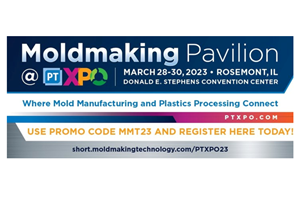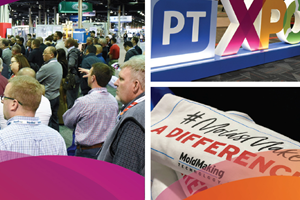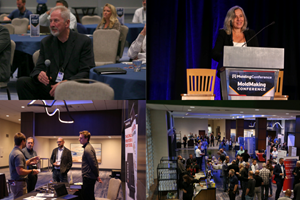Milacron's DME Announces Partnership with Linear AMS for Conformal Cooling Solution
Milacron’s DME Product Brand Announces Partnership with 3D Additive Leader Linear AMS to Provide Revolutionary Conformal Cooling Solutions under its New TruCool® Product Line
Milacron Holdings Corp., an industrial technology company serving the plastics processing industry announced that its DME product brand, a supplier of mold components, molding supplies and industrial supplies, has partnered with Linear AMS (a Moog Company) to offer metal 3D printed conformal cooling products to help improve productivity in the molding industry.
TruCool is the new DME line of products designed to help moldmakers and molders with their mold cooling. DME’s Conformal Cooling solutions utilize a cutting edge, direct metal laser melting 3D printing process to produce highly complex cavities, cores, and components with conformal cooling channels. The process achieves shapes, paths, and channel geometries impossible to obtain with conventional tooling. “We build the unmachineable!” said David Baucus, DME Product Manager. Baucus also added, “The Conformal Cooling solution places cooling channels at the optimal distance from the mold surface, consistently following the geometric shape of any mold insert for any customer part, allowing the mold to maintain a targeted, consistent temperature that allows for complete thermal control with cooling times reduced up to 100 percent. This technology also allows for conformal venting solutions for those hard to reach areas of trapped gases, when requested by the molder.”
The DME TruCool® Conformal Cooling solution starts with a detailed review of the moldmakers and/or molders’ requirements and with the use of advanced 3D CAD modeling and F.E.A. software the DME technology team can simulate the most life like and optimized cooling channels. The result allows for complex cooling channels with greater overall coverage, even distribution of cooling and the ability to provide individual insert temperature control.
The DME/Linear AMS process uses advanced Direct Metal Laser Melting (DMLM) technology, which is extremely dense and stronger when compared to direct metal laser sintering (DMLS). This allows for lighter weight solutions with improved performance characteristics to create complex shapes and improved reliability.
The moldmaker receives their Conformal Cooling (and/or venting) optimized mold cavity or core according to the specification of their 3D model with a hardness up to 56HRC with an additional +.025” rough metal to allow them to finish the cavity or core’s part surface to their own specifications. Every Conformal Cooling solution is material, flow and pressure tested to ensure quality, each time, before shipment.
With DME’s TruCool® Conformal Cooling solutions, molders will benefit from significant cycle time reduction, complete and isolated thermal control, significant quality improvements, less scrap, increased flexibility in waterline designs and the ability to visualize flow capabilities and thermal properties.
“Conventional mold cooling has remained largely unchanged for decades. DME’s partnership with Linear AMS is a huge step forward for the industry”, said Peter Smith, DME President. Smith added, “Our real world, in-field results show a significantly reduced total cycle time - between 15 and 60 percent depending on part complexity, shortening the time needed to run the part and improving part quality. That’s a significant cost savings every molder would be interested in. Likewise, OEM/product designers will benefit from the technology as it broadens the scope of part design allowing for advancements in plastic part production and application use”.
A pioneer in metal additive manufacturing, Linear AMS has 12+ years in building 3D-printed conformal cooling inserts. “We’ve taken the lessons from over a decade of building DMLM parts and established design rules and process controls that enable us to make excellent quality components that meet or exceed customer expectations,” says David Hodge, Linear AMS Vice President. “We are excited to partner with DME, a leader in the molding industry, who shares our focus for serving customers with superior products. When a customer is molding millions of parts, seeing significant process gains is a real eye-opener.”
Related Content
Where Mold Manufacturing and Plastics Processing Connect
The Moldmaking Pavilion is one of seven pavilions returning to the show that houses exhibitors offering technology and service solutions for your specific moldmaking needs.
Read MoreMore Than Moldmaking at PTXPO 2023
The Moldmaking Pavilion returns to the Plastics Technology Expo (PTXPO) March 28-30, 2023, at the Donald E. Stephens Convention Center in Rosemont, Illinois, but there’s more to discover than moldmaking.
Read MoreMoldmaking, the Relentless Pursuit of Innovation … Oh Yeah!
Innovation was at the root of the presentation lineup for the 2023 MoldMaking Conference, which included a heavy focus on automation, collaboration and communication, as well as mold design, talent development, reshoring and sustainability.
Read MoreMoldMaking Technology's Leadtime Leader Awards Competition Returns!
After a brief hiatus, MoldMaking Technology’s Leadtime Leader Awards Competition is back!
Read MoreRead Next
How to Use Continuing Education to Remain Competitive in Moldmaking
Continued training helps moldmakers make tooling decisions and properly use the latest cutting tool to efficiently machine high-quality molds.
Read MoreReasons to Use Fiber Lasers for Mold Cleaning
Fiber lasers offer a simplicity, speed, control and portability, minimizing mold cleaning risks.
Read MoreAre You a Moldmaker Considering 3D Printing? Consider the 3D Printing Workshop at NPE2024
Presentations will cover 3D printing for mold tooling, material innovation, product development, bridge production and full-scale, high-volume additive manufacturing.
Read More























